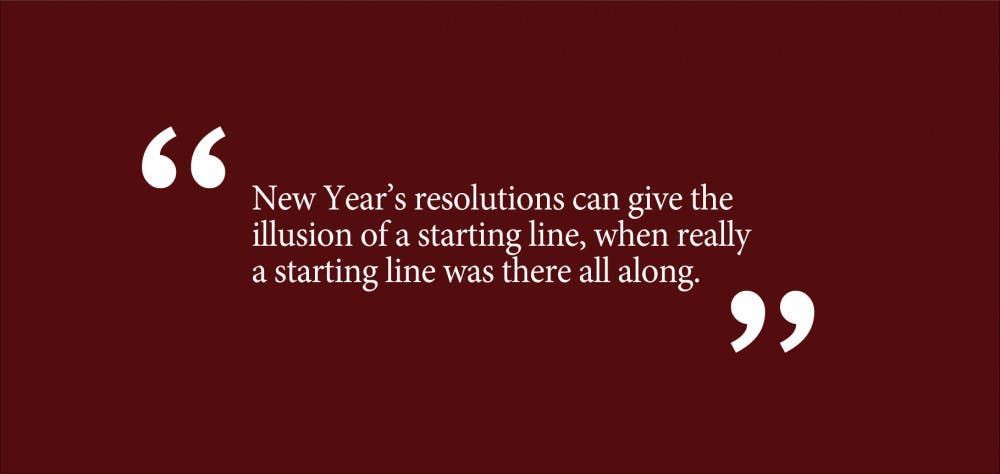For the past few years, I have made New Year’s resolutions. For the past few years, I have also failed my New Year’s resolutions. This pattern is unsurprising. As someone who enjoys reading self-help books without actually doing any self-helping, I have always had a penchant for fruitless proclamations of personal development.
A particularly damning case of my delusion comes in the form of a journal from high school. The first page simply reads: “Jan. 1, 2017: be more calm.” The following pages of angst, however, quickly contradict the clarity of mind I possessed only weeks before. One might even find an angry haiku laced within the pages, which I wrote after being benched from junior varsity soccer. Clearly, I was not getting any more calm.
Of course, I am not alone. Some studies have estimated that around 80 percent of Americans fail their own New Year’s resolutions by the following month. A lack of willpower may be to blame. But some psychologists have proposed that the very way we construct our resolutions might set us up for failure. They suggest setting smaller or more well-defined goals, something along the lines of “no more indignant poetry.” If that had been my resolution, maybe I would have succeeded.
And yet, while many analyses of New Year’s resolutions provide ways for us to improve them, few address a more fundamental question: Why do they exist at all?
To be clear, I am not against self-improvement, nor do I think that there is anything inherently wrong with making New Year’s resolutions. I simply think that it might be good for us to examine why January is a better month for introspection than May or October.
At their best, New Year’s resolutions can be a wonderful opportunity for growth. There is a performative aspect at work whenever we outwardly proclaim all the ways we want to start being healthier and happier on Jan. 1. For some people, sharing their desire to “go keto” on Facebook could provide an added social pressure to continually wolf down high-fat, adequate-protein, low-carbohydrate foods. Others who keep their goals private can also use the New Year as a springboard for personal betterment.
At their worst, however, New Year’s resolutions can allow people to defer their motivations, only to fail them at a later date. And all people, even those who succeed on their annual goals, may be procrastinating when they choose to start their resolutions on New Year’s Day.
After all, the goals we want to achieve probably don’t appear suddenly when the ball drops in Times Square. We think up new ways to improve our health, character and happiness all the time, at unexpected places and during unexpected hours. The ideal solution, then, is to pursue these improvements as soon as we can. However, many of us tend to forget, stuffing our issues into some dusty, old cabinet in the back of our brains, waiting for some external sign — maybe a holiday — to provide impetus for action.
The appeal of a fresh start is obvious. New Year’s resolutions provide clear, discernible opportunities for people to figure out all their flaws and fix them.
But in truth, holidays — whether New Year’s, Thanksgiving or Valentine’s Day — should simply remind us of our values rather than being their main source. The most important principles in life are the ones that we should reflect on continually, beyond the discrete acknowledgment granted by a special date on the calendar. New Year’s resolutions can give the illusion of a starting line, when really a starting line has been there all along.
If New Year’s resolutions work for you, by all means keep making them. Any attempt at self-improvement is admirable and should be encouraged. Yet I also think it is worth considering how the tradition can shape our own motivations. What goals are we putting off for some seemingly better moment?
For the past few years, I have failed my New Year’s resolutions. For the past few years, I have also started doing something else. I have made smaller goals over the days and weeks and months, ones that I didn’t think of as “resolutions,” which frankly carried more conviction and clarity than any aspiration I ever held on New Year’s Day. I now know that if I fail, there is no better time to try again than the present.
Johnny Ren ’23 can be reached at
jiawei_ren@brown.edu. Please send responses to this opinion to
letters@browndailyherald.com and op-eds to opinions@browndailyherald.com.





